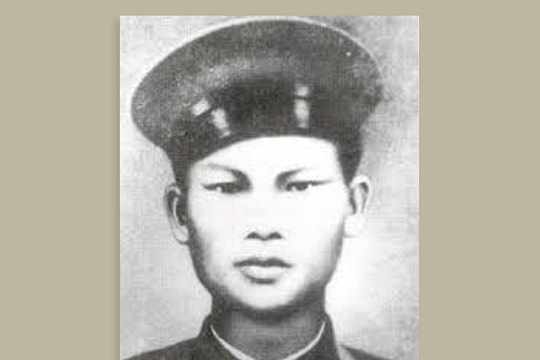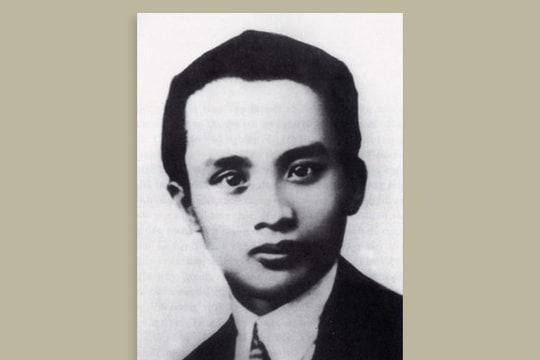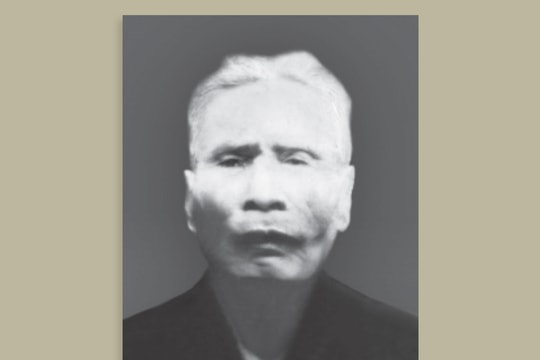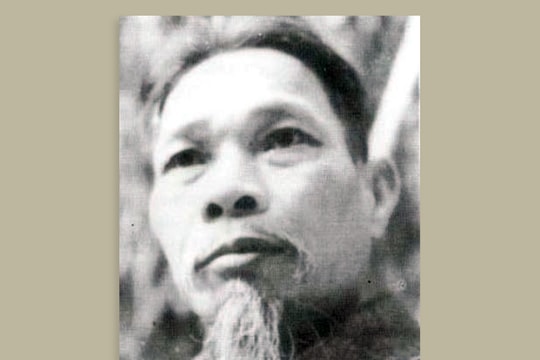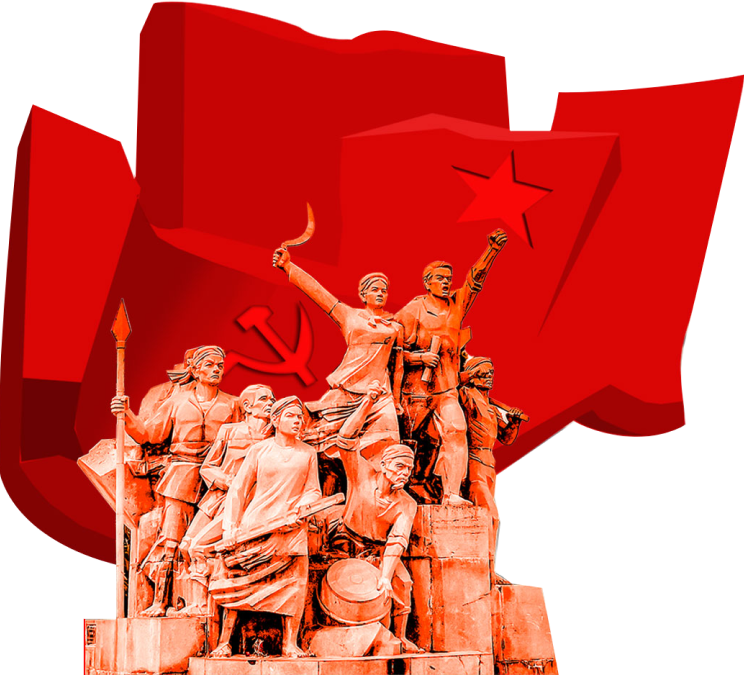Comrade Le Thiet Hung (1906-1986)
Le Thiet Hung's real name is Le Van Nghiem, born in 1906 in Dong Thon village, Thong Lang commune (now Hung Thong commune), Hung Nguyen district, Nghe An province. He was born into a family with a patriotic tradition. Le Ba Thi - his father was one of the active participants in Phan Dinh Phung's anti-French uprising in Hung Nguyen area.
In the late 19th and early 20th centuries, responding to King Ham Nghi's Can Vuong edict, the anti-French colonialist movement developed strongly throughout the two provinces of Nghe An and Ha Tinh. His hometown Hung Nguyen was one of the places with many people participating in the Can Vuong movement. After the Can Vuong movement was suppressed by the French colonialists, patriotic scholars in Nghe Tinh such as Than Son Ngo Quang, Dang Tu Kinh, Dang Thuc Hua... found their way to Siam to build a base, waiting for the opportunity to return home to operate. They built a Cay Camp in Siam, creating an economic base and practicing martial arts. From there, they returned home to select patriotic young people to train for revolution. The movement of sending young people in Nghe Tinh to study abroad developed strongly. In his hometown Hung Nguyen, there was Mr. Vo Trong Dai (aka Ngoet Dai) from Phu Xa village who had a family in Siam. Encouraged by his father, in the fall of 1923, Le Van Nghiem and 12 others went to Siam under the guidance of Vo Trong Dai. Going with him were Le Huy Doan (aka Le Hong Phong) and his friend Pham Dai (aka Pham Hong Thai).
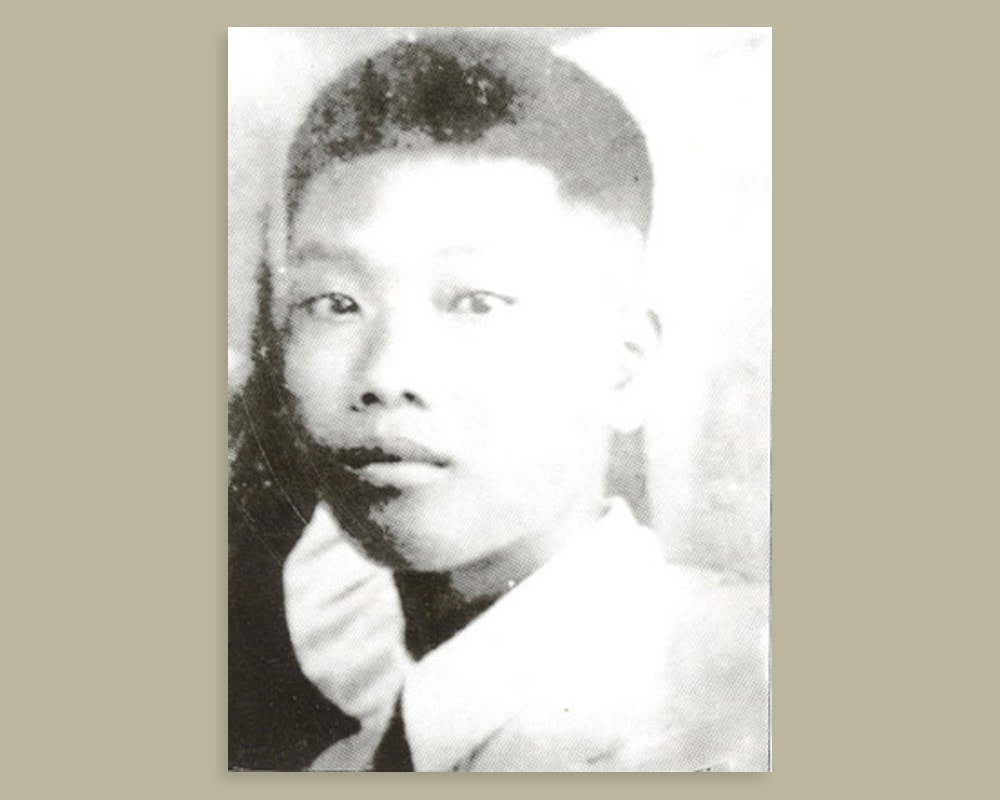
Before leaving, his father changed his name to Le Nhu Vong (meaning hope of family and homeland). From Phu Xa village, the group went through Huong Son, Laos and then to Siam. It was a difficult and arduous trip. Le Nhu Vong and his friends arrived and stayed at Co Di's Camp Cay (aka Dang Thuc Hua). He and his friends studied Chinese and worked while waiting for the opportunity to go to Guangzhou (China). Because they did not have enough money to go to Guangzhou, Le Nhu Vong had to stay at Camp Cay. Before him, Le Hong Phong, Le Hong Son, Pham Dai and Le Quang Dat went to Guangzhou. In June 1924, Pham Hong Thai's Sa Dien bomb in Guangzhou to assassinate the Governor General of Mercantile caused a great stir throughout Indochina. At the end of 1924, he and Truong Van Linh went to Guangzhou. They secretly went to Bangkok to take a ship to Hong Kong, and from there to Guangzhou by canoe. Also during this time, comrade Nguyen Ai Quoc came from the Soviet Union to Guangzhou with the great responsibility assigned by the Communist International: to build the workers' and communist movements in Southeast Asia. He was also responsible to the Peasants' International for the Asian peasant movement. Based on the organization "Tam Tam Xa" in Guangzhou, in May 1925 comrade Nguyen Ai Quoc founded "Vietnam Revolutionary Youth Association", abbreviated as "Youth Association".
After a short time in Guangzhou, Le Nhu Vong met comrade Ly Thuy (alias of Nguyen Ai Quoc). Comrade Ly Thuy introduced him and Luu Quoc Long to study in the "Peasant Movement" class and the "Education Group" to learn more Chinese. Comrade Ly Thuy introduced Le Nhu Vong and Truong Van Linh to study at the Hoang Pho Military School. After studying at this school for a month, he and other students of the school participated in fighting the bandits of Dam Dam Tay in the Vietnam-China border area. In October 1925, comrade Ly Thuy admitted him to the "Communist Youth" association (a secret group within the Vietnam Revolutionary Youth Association); comrade Ly Thuy changed his name to Le Quoc Vong (always remembering the Fatherland and the Fatherland hoping for him).
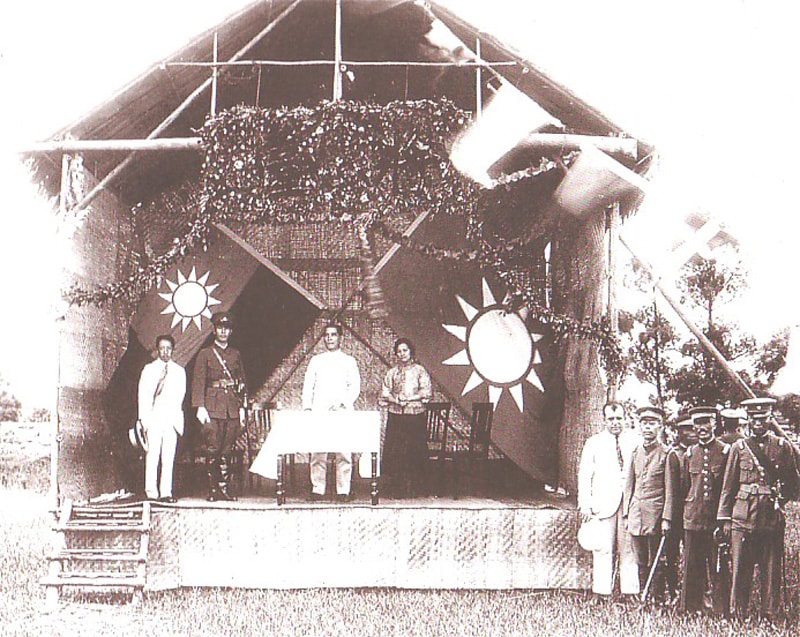
The Whampoa Military Academy was established at the request of the Sun Yat-sen government to the Soviet Union government. The Soviet government approved a decision to provide financial aid to the revolutionary government of Sun Yat-sen with 2 million Mexican dollars and sent MM Borodin to serve as a political advisor to Sun Yat-sen. The school was built on Whampoa Island on the Xijiang River, 25 km from Guangzhou. On June 5, 1924, the school cut the ribbon to inaugurate it. This was a large military school at that time and was trained by Soviet Russian military advisors. As an Infantry School, the school also had specialized classes such as Artillery, Engineering, and Communications. Later, the school was assigned the additional task of training political cadres. The school's task was to train core officers for the national revolutionary army of the Sun Yat-sen government. The principal of the school was Chiang Kai-shek and the director was Li Jishen. The school was organized according to the model of the Soviet Red Army, trained by Soviet military experts. Comrade Nguyen Ai Quoc was also a political lecturer at the school. Among the students studying at the school from 1924-1927, there were more than 30 Vietnamese students (according to comrade AI Tre Re Panop, the school's training teacher). But according to comrade Le Thiet Hung: "the number of Vietnamese students at the Hoang Pho Military School was more than 200" ("Forever grateful to the person". Memoirs of Le Thiet Hung, excerpted in Dau Nguon. Literature Publishing House, Hanoi, 1975, page 286).
Le Quoc Vong's class had 8 Vietnamese people, he studied the Infantry class, 3 studied the Artillery class and the rest were in other departments. The next class had more than 200 people studying all the departments. Two days every month, they went back to Guangzhou by boat to study political theory taught by Nguyen Ai Quoc.
On February 12, 1925, Sun Yat-sen passed away. In April 1927, Chiang Kai-shek began to betray Sun Yat-sen's "friendly Russia, tolerating communism, supporting workers and peasants" policy. In order to carry out his plot to seize the leadership of the Kuomintang, Chiang staged a coup in Shanghai (April 12, 1927) and carried out a series of terrorist suppressions against revolutionary forces, mainly targeting the Chinese Communist Party bases and workers throughout the cities. On April 13, 1927, Li Jishen (Chiang's right-hand man) staged a coup in Guangzhou. The right-wing army destroyed the Huangpu School, and Le Quoc Vong, 7 people in the class, and more than 200 Vietnamese students from the next class were arrested. They detained the students in a floating prison on the Pearl River for a while and then released them. He and the students followed the school to Nanjing to continue their studies. After graduating from Whampoa School, he was assigned to serve as a staff officer in Chiang Kai-shek's Division Headquarters.
The Guangzhou Uprising broke out on December 11, 1927. Le Quoc Vong and a number of Vietnamese students studied at Whampoa School such as:Ho Tung Mau, Truong Hoc Ba, Truong Van Linh, Luu Quoc Long... joined the Chinese communists to fight against the reactionary Chiang Kai-shek with a deep international sentiment. Due to the huge difference in the balance of power, the uprising failed and was suppressed by Chiang's army in a sea of blood. Le Quoc Vong was not exposed, but he lost contact with comrade Ly Thuy. He met comrade Ho Tung Mau in Guangzhou and was sent by Ho Tung Mau to Nanjing to find out how the studies of the 200 students of the next class were going. He and Luu Quoc Long went to Nanjing, but the two were arrested by the reactionary Kuomintang for a week. Returning to Guangzhou, he received contact from comrade Ly Thuy. It was very exciting. Previously, according to comrade Ly Thuy's plan, after graduating from Hoang Pho school, Le Quoc Vong would be sent to the Soviet Union to continue studying at Phuong Dong University (the Communist University of the Working People of the East named after comrade Stalin). Comrade Li Rui summoned him to Shanghai and assigned him a very important mission; Comrade Li Rui told him: “You are in Chiang Kai-shek’s army. That is an advantage. You discuss with Mr. Hu Xue Lam how to obtain documents about this attack plot to hand over to the Chinese Communist Party. Wherever you work, you must participate and organize there, you must consider the Chinese revolution as the Vietnamese revolution” (Forever grateful to Him..)
The plan changed, he would have to wear the uniform of Chiang Kai-shek's army officer to help the Chinese revolution at the request of the Chinese Communist Party. Because after the Guangzhou Uprising, the Chinese Communist Party suffered heavy losses, Chiang Kai-shek was preparing to attack the Chinese Red Army on all fronts.
Le Quoc Vong understood that he needed to accumulate more experience to serve the Fatherland later. But first, he had to fulfill the international mission that the Party requested help from. Comrade Ly Thuy gave him the code name "Ebony Tree" (this was understood both figuratively and literally: his skin was slightly dark, and no matter what the circumstances, it would not be affected by termites, he was steadfast in nature, and loyal like an Ebony Tree). Comrade Ly Thuy gave him a cross-shaped card as a signal to communicate with his comrades from the Chinese Communist Party.
As an officer in Chiang Kai-shek's army, with the position of Infantry Platoon Leader, he went deep and secretly planted good people into the squads under his command. Some of those squads, after being trained and equipped with new weapons, suddenly "disappeared" and became the revolutionary army of the Chinese Communist Party. At that time, desertion in Chiang's army was considered a trivial matter, because the more deserters there were, the more opportunities there were for superiors to create fake numbers to benefit. In the winter of 1928, Le Quoc Vong was promoted to Company Leader. His unit was sent to perform a mission close to the Soviet border. At the request of the other Party, he applied for a transfer to work as a railway officer on the Shanghai - Nanjing - Hankou railway line. In his new position, he helped the other Party with many important tasks such as transporting documents and weapons as requested or sometimes successfully swapping and freeing political prisoners.
At the end of 1929, he returned to Shanghai to meet comrade Ly Thuy. After the Guangzhou uprising, comrade Ly Thuy went to Siam, passed through the Soviet Union and returned to China to avoid the pursuit of Chiang's army. Comrade Ly Thuy raised the request of the friendly Party to suggest that Le Quoc Vong stay in the enemy ranks for a while longer to help them grasp the news and plots of Chiang Kai-shek's army. And in Shanghai, he was admitted into the Communist Party of Vietnam by comrade Ly Thuy.
To do well the assigned task, Le Quoc Vong had to rely on Mr. Ho Hoc Lam - an important figure in the Chiang army. Since arriving in Guangzhou, he knew that Ho Hoc Lam was a patriotic Vietnamese person. His father participated in the Can Vuong movement and was murdered by the French and his wife was the daughter of Than Son Ngo Quang - a talented general of Phan Dinh Phung who had to hide in Siam to build the Trai Cay base and wait for the opportunity to operate. Due to unavoidable circumstances, he had to work in the Operations Department of the General Staff of the Chiang army, but he still had a deep love for his homeland. His house was a base frequented by Vietnamese patriotic youth. He had prestige in the Chiang army, and was a classmate of Chiang Kai-shek at the Tran Vu Military Academy (Tokyo - Japan) and Bao Dinh School (Beijing). Chiang was also indebted to Ho Hoc Lam, because he once brought troops to relieve Chiang during the Northern Expedition. Le Quoc Vong asked Ho Hoc Lam to find a way to get documents and battle plans of Chiang's army into the Soviet base of the Chinese Communist Party. Ho Hoc Lam accepted, although he knew it was extremely difficult and dangerous, affecting his life and family. At that time, the General Staff of Chiang's army was directly directed by German military advisors and followed the model of the German fascist army. Therefore, the strictest and most stringent discipline was still the management of files and documents. After working hours, all documents had to be sealed and put in a safe, and no documents were allowed to be taken home. To have documents for Le Quoc Vong, Ho Hoc Lam had to read the documents carefully and memorize them during the day. When he returned home in the evening, he remembered to copy down every sentence and idea, redraw them and add them to the map he had prepared at home. In addition, he also spent a lot of money and gold to bribe other officers to get information. Occasionally, in his position, Ho Hoc Lam inspected some units about to go into battle to verify the documents he had read. Le Quoc Vong had to use the method of internalizing that news to pass it on to the other Party.
From Summer to Fall 1930, important news was passed to the Chinese Red Army such as: Chiang's army banned the transport of rice down the Nhu Thuy and Cong Giang rivers, the divisions of Truong Huy Man, Dam Dao Nguyen, and Luu Hoa Dinh had just increased their troops and equipped them with more weapons... Or the plan to attack the headquarters of the Chinese Communist Party approved by Chiang Kai-shek, the scope and target in the La Lam - Nghi Hoang - Le Xuyen - Thuy Kim quadrangle, the troops participating in each stage of the attack... And the result was that the attacks of Chiang's army on the Soviet zone of the Chinese Communist Party all failed. There was a time when Chiang Kai-shek himself commanded, with a German advisor named Seelt, with 300,000 troops mobilizing to attack the Red Army but all failed. Frustrated by the consecutive failures, in October 1930, Chiang mobilized manpower to launch a fourth general attack, but was unsuccessful. After such times, there were rumors within Chiang's army about "hunting for internal traitors". Le Quoc Vong began to be followed by Chiang's secret agents, wherever he went, people followed him.
At this time in the country, the Nghe Tinh Soviet movement was bloodily suppressed. Comrade Tran Phu (General Secretary of the Indochinese Communist Party) fell into the hands of the enemy. Comrade Nguyen Ai Quoc was captured by British secret police in Hong Kong. In May 1932, when Le Hong Son and Nguyen Thi Minh Khai came from Hong Kong to Shanghai to meet Le Quoc Vong, he discussed the revolutionary situation with the two. Le Hong Son had cholera and had to be treated at the "Shanghai Epidemic Hospital", and after about a month, he ran out of money. Le Quoc Vong had to take comrades Bui Hai Thieu and Nguyen Thi Minh Khai to stay at Ho Hoc Lam's house in Nanjing. Then from Nanjing, he went to Hong Kong through the introduction of a Communist Party member in Guangzhou. When he returned to Nanjing, he went to Shanghai with Nguyen Thi Minh Khai, Bui Hai Thieu, and Tran Ngoc Danh to contact the Chinese Communist Party through Truong Phuoc Dat. He was interrogated by the Central Committee of the Party after Chiang's army hunted down the Communist Party in Hong Kong and Shanghai. After establishing contact with the Party and through interrogation, the Party asked him to continue to stay in Chiang's army to create conditions to help the Party.
To cope with the bad situation and facilitate revolutionary activities, Ho Hoc Lam had to move his family for the fourth time. Le Quoc Vong and some others were denounced by the French imperialists as dangerous communists and liaisons between Shanghai-Hong Kong-Vietnam. They offered a reward of 500,000 Indochinese piastres for his capture. However, many people in the Kuomintang still thought that Le Quoc Vong was Ho Hoc Lam's cousin, so they did not dare to take action.
In October 1933, Chiang's army, with the tacit support of Britain, France, and Germany, attacked the Chinese Red Army and took the initiative on the battlefield. The Chinese Communist Party and the Red Army retreated to the West, carrying out the Long March to Sichuan and Gansu. Le Quoc Vong lost contact with the Chinese Communist Party from then on.
Since September 1931, Japanese fascists began to invade China; by January 1933, the Japanese army had occupied Inner Mongolia, Rehe, and crossed the Great Wall, threatening the capital Beijing and the North China region. In July 1937, Japan occupied Nanjing, Shanghai, Hankou, Xuzhou... The Chiang army retreated to Chongqing in Sichuan province. In order to have the conditions to travel and communicate with the friendly Party, Le Quoc Vong requested to be transferred to the Transport Corps, commanding a transport battalion running the Jiangxi - Hunan - Guizhou route.
After a while, he was promoted to colonel and appointed as principal of the training school for tank, armored vehicle, transport vehicle and technical soldier drivers. During this time, he took the opportunity to learn to drive tanks and master the mechanical principles of various vehicles. He believed that in the future, the Vietnamese Revolutionary Army would have tanks and armored vehicles and would need that knowledge. In early 1939, the Party sent a cadre to contact Le Quoc Vong to ask him to help the Eighth Route Army in the North China region, which was lacking in guns, ammunition and medical equipment, and only he was capable of providing this help. He asked to go to the First Transport Regiment in the North China region. He was immediately accepted, because it was a fierce war zone. Most of the Japanese main force was concentrated in this area, and no general in Chiang's army wanted to go. He was assigned to command Battalion 106, consisting of 8 motor transport companies operating in a large area including the regions of Ha Nam - Son Tay - Cam Tuc... With his cleverness and flexibility, he gained the trust of his superiors and had prestige with the soldiers. In just half a year, he helped and handed over to the Party 30 tons of weapons, medical equipment and medicine... for the Eighth Route Army to fight the enemy.
In the summer of 1940, Le Quoc Vong received an order from the organization asking him to leave Chiang Kai-shek's ranks and take up a new assignment. The first letter was from comrade Phung Chi Kien; the second letter was from the writer calling himself "Vuong" and sent to "Ebony Tree". So he had made contact with comrade Nguyen Ai Quoc. He was extremely happy. He asked his father-in-law, Mr. Ho Hoc Lam, to transfer him to South China (he had become Ho Hoc Lam's son-in-law in 1937) on the grounds of poor health. The journey from North China to South China was very difficult. There was a time when he was almost shot because Chinese guerrillas arrested him on suspicion of being a traitor (he was found to have the rank of colonel of Chiang Kai-shek's army). After a period of detention and many interrogations in Son Tay province, he was released and returned to Guilin. There he met comrade Nguyen Ai Quoc. He reported to comrade Nguyen Ai Quoc about his activities in the Kuomintang General Staff and together with Mr. Ho Hoc Lam gathered information about Chiang Kai-shek's top secret plans. He was sent back to the country by comrade Nguyen Ai Quoc to take up a new assignment.
At the end of 1931, in Pac Bo, Le Quoc Vong was assigned by comrade Nguyen Ai Quoc to work with comrade Le Quang Ba to establish a Viet Minh guerrilla team of 12 people. Comrade Le Quang Ba was the team leader, Hoang Sam was the deputy team leader and Le Quoc Vong was both the political commissar and Party cell secretary. The first Vietnamese guerrilla team was established. The team had the following tasks:
- Protect the agency, protect the staff
- Armed propaganda
- Special communication
- Military mission
- To be the core for building armed and semi-armed forces later.
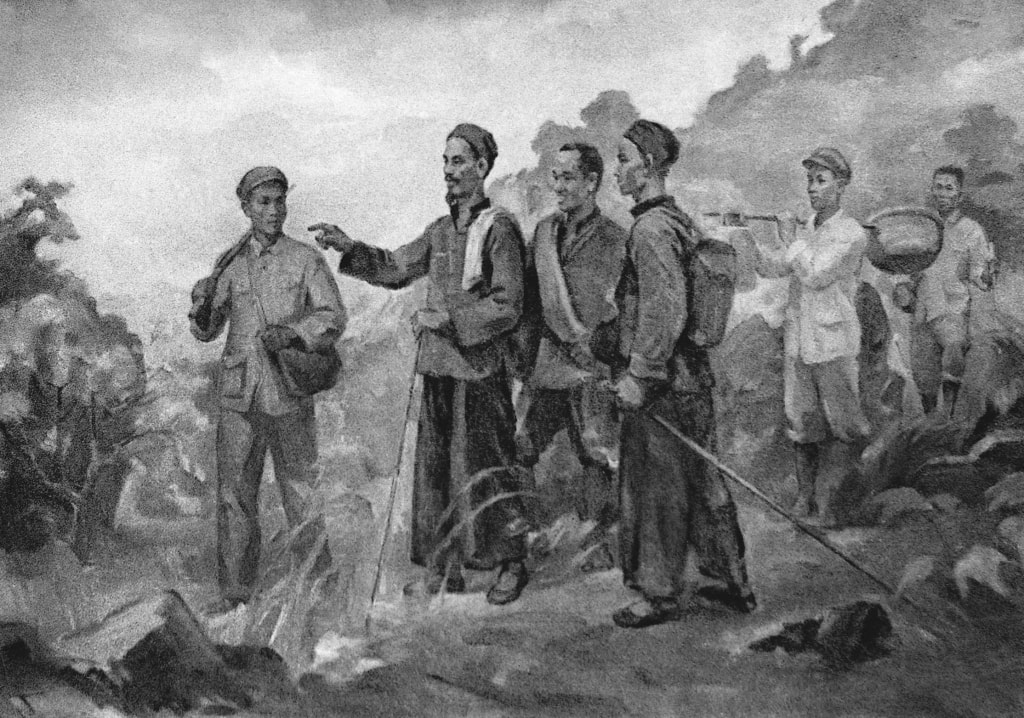
According to the memoirs of comrade Le Quang Ba: “Around the beginning of the fourth quarter of 1941, comrade Le Dinh (aka Le Thiet Hung) from China came back to meet Uncle Ho in Pac Bo. Uncle said: Comrade, stay here, study the situation in all aspects and then discuss the work”. From then on, comrade Le Thiet Hung stayed and worked with us. I thought to myself, Uncle Ho must have had some intention in telling comrade Hung to stay, because after comrade Phung Chi Kien sacrificed, only comrade Hung was present in Pac Bo, the only one who received formal, basic and systematic military training at the Hoang Pho Military Academy. One afternoon, Le Thiet Hung and I were sitting discussing work as usual, when Uncle Ho arrived. He told us: “The more the Viet Minh movement develops, the more the enemy will find ways to deal with it... here now there are some guns... and each person is scattered in a different place... Therefore, comrade Le Dinh and comrade Le Quang Ba should discuss together how to organize the armed forces. You comrades make a plan and then report”... The selection criteria that Dinh and I both agreed on was to first choose people who are loyal to the revolution, brave, healthy, have guns and have been tested in reality. We immediately chose comrades Bang Giang, Duc Thanh, Be Son Cuong, The An from the 43 people attending the class in Nam Quang (Tinh Tay, Quang Tay province, China). So including Hung, Sam and I, there were only 7 people. As local people, and having been active in this area for a long time, I named each person and then together with Hung selected 5 more people to join the team. Thus, the first armed team in Pac Bo consisted of 12 people, including a female comrade named Nong Thi Trung" (Memoirs of Comrade Le Quang Ba, Military History Research Journal. December 1984).
The Team was attended by Uncle Ho at the founding ceremony and he personally drafted 10 disciplinary rules and principles for building and operating the Team. The Team had a Party cell of 6 comrades and comrade Le Quoc Vong was the Secretary.
After the Japanese coup against the French (March 9, 1945), Le Quoc Vong commanded an armed unit and led the people to seize power in That Khe, Dong Dang, Na Sam (Lang Son province), collecting thousands of enemy weapons to equip the first revolutionary troops.
In October 1945, comrade Le Quoc Vong was appointed by Uncle Ho as commander of Inter-Zone Four, comrade Ho Tung Mau as Political Commissar, Hoang Dien as Chief of Staff, and Tran Van Quang as head of the political department.
The August Revolution succeeded, the young Democratic Republic of Vietnam had to endure pressure from internal and external enemies. In the North, 200,000 Chiang Kai-shek troops entered under the guise of the Allied forces to disarm the Japanese army. In the South, tens of thousands of French expeditionary troops hiding under the shadow of the British army returned to plot to invade our country once again. The Preliminary Agreement on March 6, 1946 was signed. According to the appendix of the Agreement, our Government had to organize a "Reception Army" to replace the Chiang Kai-shek troops to supervise their withdrawal and to force the French to properly implement the signed Agreement. And in order for the Chiang Kai-shek troops to "withdraw with honor", the French troops had to respect each other in their behavior and when communicating, our Commander-in-Chief had to wear the rank of general to correspond to their commander. The Party Central Committee and Uncle Ho chose Le Quoc Vong as Commander-in-Chief of the "Reception Army" with the rank of general. At that time, he was holding the position of Chief of Zone Four. Accompanying him to the Central Committee was comrade Tran Van Quang. He was given a new name by Uncle Ho, Le Thiet Hung; with the hope that his “steel” and “heroic” qualities would be promoted in the new fight against the French colonialists. Comrade Tran Van Quang was the political commissar in the “Reception and Defense Army” organization.
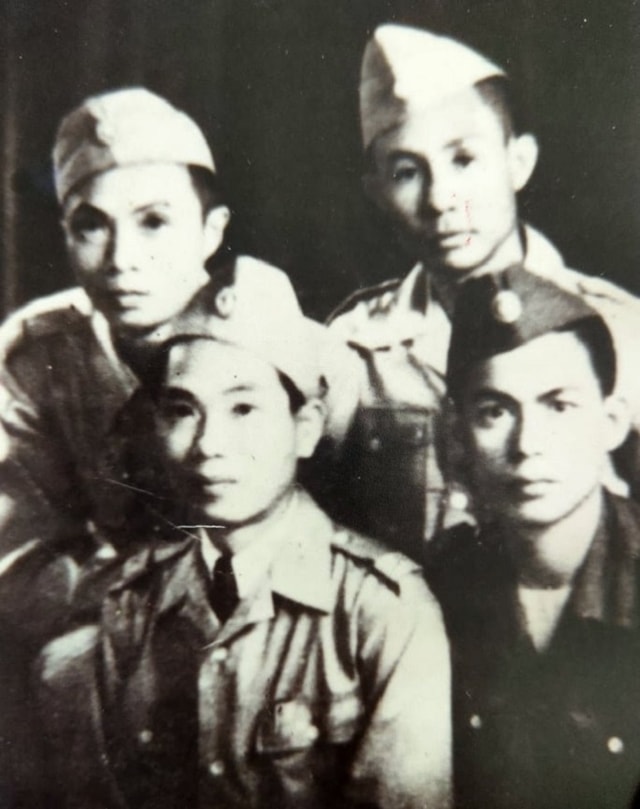
According to Decree No. 185 dated September 24, 1946, he was the first Major General of the Vietnam People's Army. It was not until two years later, on May 28, 1948, in the Viet Bac resistance base, that our Party and State officially held a ceremony to confer the ranks of general and colonel on a number of key comrades in our army.
Having successfully completed the task of Commander-in-Chief of the “Reception Army” in the resistance war against the French, in November 1946, comrades Le Thiet Hung and Tran Van Quang were transferred to become commanders and political commissars of Inter-Zone Four. After comrade Nguyen Son replaced him, comrade Le Thiet Hung went to the Central Committee. Major General Le Thiet Hung was assigned to be the first Inspector General of the army, concurrently Director of the Propaganda Department and Principal of the Tran Quoc Tuan Army School in 1948.
In the spring of 1948, the French suffered a heavy defeat in the campaign to attack the Viet Bac base, forcing them to abandon the strategy of quick strikes and quick victories and switch to a protracted battle, using total war, implementing the policy of "using war to feed war, using Vietnamese to fight Vietnamese". On our side, the armed forces were trained and matured. The comparison of forces between us and the enemy had changed in our favor. However, our regular army and militia were not strong enough to be able to fight on a large scale. Therefore, the training and education of commanding officers became an urgent requirement that the Party and the State paid attention to. Tran Quoc Tuan School was born in that context.
This was the first long-term and regular training course of our Army opened in the early stages of the war to protect the Fatherland, liberate the nation, with many difficulties. The school was organized in Binh Dinh, Tan Cuong, with Guoc Mountain, Cong River... safe zones. Comrade Le Thiet Hung devoted all his energy to the new task, training good students to serve the new war. The feelings of the school's staff and teachers towards comrade Le Thiet Hung were very deep. They considered him the eldest brother in the Tran Quoc Tuan Army family. He was an extremely strict brother, not lenient in ignoring any small ways for those who violated school regulations; at the same time, he was a very dear elder brother who took care of everyone's meals and sleep. No matter what the weather conditions were, comrade Le Thiet Hung was never absent from the training ground or on field trips. He is an exemplary person in implementation and has attracted cadres and students to strive and compete to overcome all difficulties and hardships to complete their tasks well with the determination of "only moving forward, never retreating".
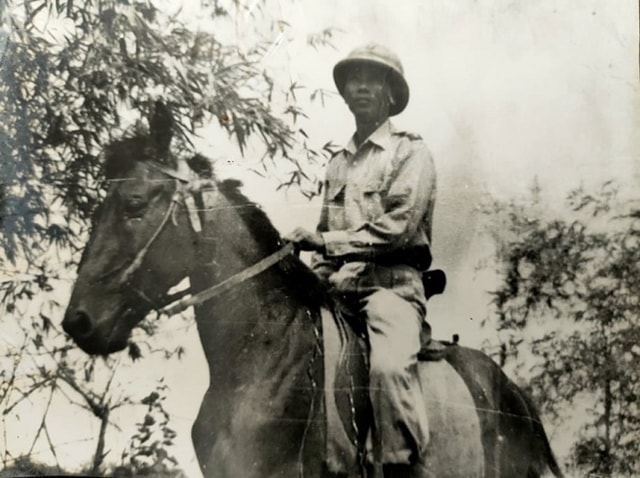
When the Dien Bien Phu campaign opened, comrade Le Thiet Hung was assigned to join the campaign command.
In 1956, the Artillery Corps was established, comrade Le Thiet Hung was appointed as the Artillery Corps Commander. On February 18, 1957, the Artillery Officer School was established, and he also held the position of Principal. During this period, the school's facilities were still poor, and the school had to rely on the old barracks of Regiment 63 stationed in the Kim Dai flat house area near Tong airport (Son Tay). In addition, it was necessary to build more thatched, bamboo, and reed houses to be in time for the opening of the school year. The new teaching staff was trained in Zhengzhou (China). The number of students had to study more and review culture to have enough knowledge to absorb artillery techniques.
The accommodation was far from the training site, so every day the teachers lived and ate at the citadel (Son Tay town), cycling to Kim Dai to train and teach. The training curriculum was not yet available, there was a lack of professional officers... it was really hard and difficult. However, comrade Le Thiet Hung and the school overcame everything and completed the task well. He was often affectionately called "Mr. Xay" by the cadres, because he always wanted to build a regular army, good at tactics and with strict discipline.
He often said: schools must focus on basic training. Good basic training, grasping theory while mastering and performing movements well, students will be able to apply it better in actual combat.
In 1963, at the request of the Party Central Committee, comrade Le Thiet Hung transferred to foreign affairs: as Plenipotentiary of the Democratic Republic of Vietnam in the Democratic People's Republic of Korea (1963-1970). At this time, the fight of the Southern people against American imperialism was developing strongly. The diplomatic relations between Vietnam and North Korea were increasingly good. Despite difficulties, our friends provided weapons and combat equipment, contributing to bringing our resistance war against America to complete victory.
In 1970, comrade Le Thiet Hung returned to Vietnam to work as Deputy Head of CP48 and the Central Foreign Affairs Committee until his retirement.
To help comrade Le Thiet Hung overcome all difficulties and hardships, successfully completing the tasks assigned by his superiors; we cannot fail to mention his life partner. During the years of working together to help the Chinese Communist Party, Mr. Ho Hoc Lam loved Le Quoc Vong very much. And he had chosen a future son-in-law for his eldest daughter, Ho Diec Lan. In 1937, the wedding of Le Quoc Vong and Ho Diec Lan was held with the participation of comrade Le Hong Phong who had just returned from attending the 5th International Congress of the Communist Party. At this time, Ho Diec Lan was 17 years old. Having just graduated from high school, Ho Diec Lan worked as a worker at the Hunan Silkworm Breeding Company. During this period, in China, the movement of rural, urban youth, and progressive intellectuals all left Chiang Kai-shek's white area to go to the revolutionary base of the Communist Party in Dien An. In Yan'an, she was sent to study at the Shaanxi Workers' University opened by the Communist Party in the Shaanxi - Gan-Ning base area. Graduating with honors, Hu Yilan served in the base and was later admitted to the Chinese Communist Party. Living in the base from 1938 to 1941 was extremely difficult, with a harsh climate and poor food. Hu Yilan contracted a cold, an incurable disease at that time. At that time, Le Quoc Vong was traveling to help the friendly Party, so the two had little time together. In 1941, our Party organization planned to send Hu Yilan to Hanoi to work as an overseas Chinese, but at that time the Party base in the country was being severely terrorized, so she could not return. In June 1946, Hu Yilan, her mother and younger sister Hu Maola were welcomed back to the country by our government representative to reunite with their family. Mr. Hu Xue Lam died in Chongqing in 1943 due to illness.
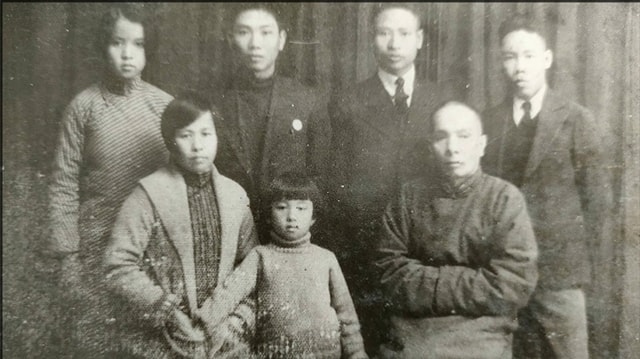
In October 1947, due to a relapse of tuberculosis, Ho Diec Lan passed away in her husband's hometown at the age of 27 without ever becoming a mother after 10 years of building a family.
Le Thiet Hung's second wife was military doctor Nguyen Tuyet Mai. Ms. Mai was born in 1924 and was a student at Dong Khanh School (Hanoi). Graduated from the obstetrics department of Hanoi University of Medicine and Pharmacy in 1945, she participated in revolutionary activities early in the youth movement of the capital. In 1948, she became the wife of Major General Le Thiet Hung. Although she was the wife of the general, she still climbed mountains and waded through streams to work and fulfilled her duties as a military doctor. At one point, she followed Tran Quoc Tuan Military School to Yunnan (China) to take care of the health of students. She served in the army until her retirement.
In 1986, comrade Le Thiet Hung passed away at the age of 80 and was buried at Mai Dich cemetery (Hanoi).

